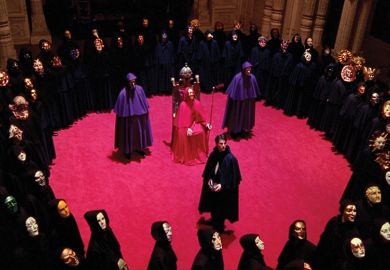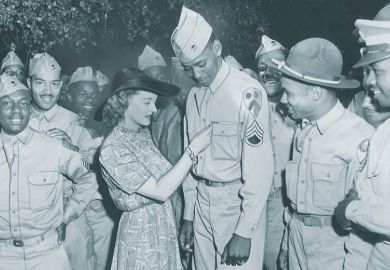At the 1961 trial of Nazi bureaucrat Adolf Eichmann, one witness introduced the notion of “Planet Auschwitz”. Taking that as his starting point, Brian E. Crim contributes to the scholarship exploring how the Holocaust has filtered down and across popular culture, leaving its trace in numerous ways. His focus is on how it has influenced and shaped science fiction and horror film and television over the past half-century but particularly over the past 20 years.
As Crim shows, these two genres offer rich possibilities. The issues, in fact, stretch back to the pre-Holocaust era. It has been argued (not without controversy) that German Expressionism’s allusion to Jews and Jewish themes, and tropes such as Dracula and vampires, helped contribute to the German population’s readiness for Hitler. Following the Second World War, the figures of the golem and the vampire had an enduring impact on some of the classics of science fiction (pretty much anything featuring a cyborg or android) and horror.
The real meat of the book, however, is in its discussion of the influence of the Holocaust on a range of films and television series since 1945. Making reference to those whom psychoanalyst and Jewish survivor Bruno Bettelheim called the “walking dead” of the camps, Crim discusses the zombie genre from George Romero’s trailblazing sequence of films, starting with Night of the Living Dead (1968), through to the recent TV series The Walking Dead. He then tackles a series of films and television shows, from the well known (Sidney Lumet’s The Pawnbroker, 1967) to much more obscure ones that depict Nazi zombies and vampires. These include Blood Creek (2009) from Jewish director Joel Schumacher, whose The Lost Boys (1987) reinvigorated the zombie genre.
The chapter on what Crim calls “Astrofascism” (a play on the phrase “Astrofuturism”) considers Nazis and the Holocaust in science fiction, including Star Trek and Star Wars. But more recent televisual offerings are included, namely The Man in the High Castle (2015-19) and V (1983). Crim ends where he began, returning to the golem theme by looking at cyborgs. Here I learned that Ridley Scott’s Blade Runner (1982) drew on the Holocaust research that Philip Dick conducted while writing the original novel The Man in the High Castle (1962).
For me, the most enjoyable chapter is the one looking at the period of New Horror, during which a spate of celebrated horror films – Rosemary's Baby (1968), The Exorcist (1973), The Omen (1976) and The Shining (1980) – were made by Roman Polanski, William Friedkin, Richard Donner and Stanley Kubrick. Although none of these movies made any explicit allusion to the Holocaust, it is surely more than a coincidence that they were all directed by Jews.
My quibble here is that much more could have been said about these iconic films, utilising newer scholarship (the section on The Shining is far too reliant on one dated source). And while Crim discusses Franklin J. Schaffner’s The Boys from Brazil (1978), the subtextual allusions in his earlier science fiction (and horror) film Planet of the Apes (1968) would also have provided some suggestive material. The discussion of Jews and Judaism is also at times unbalanced and could have been productively mined in more detail.
Nathan Abrams is professor in film at Bangor University and author of Stanley Kubrick: New York Jewish Intellectual (2018) and, with Robert Kolker, Eyes Wide Shut: Stanley Kubrick and the Making of His Final Film (2019).
Planet Auschwitz: Holocaust Representation in Science Fiction and Horror Film and Television
By Brian E. Crim
Rutgers University Press
280pp, £109.00 and £30.50
ISBN 9781978801615 and 9781978801608
Published 15 May 2020
POSTSCRIPT:
Print headline: Undead fed by real-life dread
Register to continue
Why register?
- Registration is free and only takes a moment
- Once registered, you can read 3 articles a month
- Sign up for our newsletter
Subscribe
Or subscribe for unlimited access to:
- Unlimited access to news, views, insights & reviews
- Digital editions
- Digital access to THE’s university and college rankings analysis
Already registered or a current subscriber? Login








